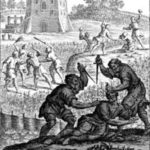We run our website the way we wished the whole internet worked: we provide high quality original content with no ads. We are funded solely by your direct support. Please consider supporting this project.

Finger-Pointing and the Impulse to Judge
To no one’s surprise, yet to the sadness of many of us, several Christian spokespeople, including James Dobson, Mike Huckabee and Bryan Fischer, are blaming the shootings in Newtown, Conn, on abortion and gay marriage. This is sadly reminiscent of Jerry Falwell’s hurtful response to 9/11 when he divined that “the pagans,” “abortionists,” “feminists,” “gays,” “lesbians,” “ACLU” and “People For the American Way” were to be blamed. It’s reminiscent as well, on a smaller scale, of John Piper’s disturbing public declaration that the collapse of the 35W bridge here in Minneapolis that killed 13 people was God warning us about our sin and the toppling of a church steeple by a tornado was God warning a denomination not to ordain gays.
It seems to have become a staple of American conservative Christianity to respond to tragedy – when people most need to be reminded of God’s comforting and healing love – to grab a megaphone and accuse.
How very different is the posture that the NT teaches God’s people to have. When Jesus confronted people who claimed to discern the punishing hand of God in the face of tragedy, he rebuked them by telling them to worry about their own relationship with God (Lk. 13:1-5). He taught us to never look for specks in other people’s eyes, because we have planks sticking out of our own (Mt. 7:1-3). Whatever sin we think we discern in another person, in other words, we should regard it as a mere dust particle compared to our own plank.
Reflecting the same humble mindset, Paul taught us “a trustworthy saying that deserves full acceptance” by everybody: namely, that “Jesus came into the world to save sinners – of whom I am the worst” (1 Tim.1:15). Knowing that we are all sinners in desperate need of a savior, we should each confess that we are the worst of sinners. It would never occur to someone who took these teachings of Jesus and Paul seriously to ever try to put the blame for a tragedy – or even a damaged church steeple – on someone else’s sin!
I’m remind of Paul’s beautiful teaching that God “reconciled us to himself through Christ and gave us the ministry of reconciliation.” He then fleshes out what this means when he repeats: “God was reconciling the world to himself in Christ, not counting people’s sins against them, [a]nd he has given us the ministry of reconciliation” (2 Cor. 5:18-19). In other words, God handed over to us the wonderful assignment to manifest his love and saving work by never counting people’s sins against them! Our job is to do the exact opposite of what Satan, the Accuser (Rev. 12:9) does. From the garden, to Job, to the end of the age, he holds people’s sin against them and inspires to do the same. All who follow Jesus are called to engage in warfare against this enemy of humanity by manifesting the loving attitude of Jesus when he offered up his life to free all from their sin, praying for our forgiveness with his last breath (Lk 23:34).
I don’t doubt the sincerity of those who respond to tragedy by pointing fingers. But I want to, in love, warn them that in pointing fingers, they’re unwittingly aligning themselves on the side of the cosmic finger-pointer.
For my two cents, I’d much rather find myself on the side of the one who died to end all finger-pointing.
Category: Q&A
Tags: Bryan Fischer, Christianity, Current Events, Evil, Forgiveness, James Dobson, John Piper, Judgement, Judgment, Love, Mike Huckabee, Newtown, Problem of Evil, Satan
Topics: Following Jesus, Providence, Predestination and Free Will, The Problem of Evil
Related Reading

The Violent Vineyard Owner: A Response to Paul Copan (#8)
In my previous post I addressed two of the three parables that Paul Copan argues present God in violent ways. Today I will address the third, which is the parable of a vineyard owner with hostile tenants (Matthew 21:33-41; Luke 20:9-13). This parable differs from the previous two parables. Whereas the previous parables deal with…

Warfare Worldview: A Basic Definition
The warfare worldview is based on the conviction that our world is engaged in a cosmic war between a myriad of agents, both human and angelic, that have aligned themselves with either God or Satan. We believe this worldview best reflects the response to evil depicted throughout the Bible. For example, Jesus unequivocally opposed evils…

Jesus and those “Other People”
Adele Booysen via Compfight Nicky Marshall is the husband of one wife (Raquel), father or two boys (Nathan and Elijah) and serves as assistant pastor at The Living Room Church in Barbados. Nicky is also an Artist and Surfer. He blogs here. “This is Ferozah”. I instinctively stuck my hand out to greet a smiling Muslim…

Thou Shalt Not Fear Science-Part II
Yesterday I called your attention to Bev Mitchell’s essay in which he integrated science and theology as he reflected on power and love. This is part II of his essay and it’s on the limiting conditions of creation. It’s a fascinating speculative reflection on why God’s creation is the way it is and what our role is in…

God Does Not Always Get What He Wants
One of the ways the Bible makes it clear that humans have free will and that God doesn’t predetermine human decisions is found in the responses God has toward human choices. Scripture consistently depicts God as being frustrated by the way his people obstinately resist his plans and Scripture often depicts God’s heart as breaking…

Jesus Did Not Teach Ethical Behavior
Image by a2gemma via Flikr Paul teaches that love is not rude (1 Corinthians 13:4–5). If we forget that the New Testament is about the new life given us in Jesus Christ, we easily misinterpret this passage to be an ethical injunction. We read it saying, “Thou shall not be rude.” So in sincere obedience we set…

